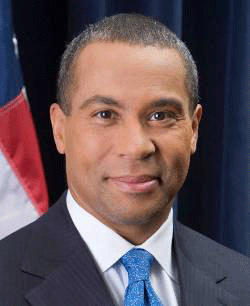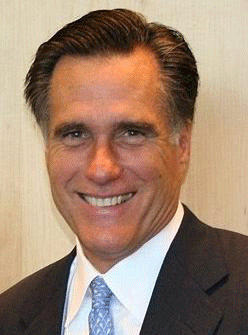Power Shift - Massachusetts Energy Conservation
Air Date: Week of August 24, 2012
 |
Grades are in, and Massachusetts leads the pack on energy conservation efforts. Living on Earth's Jeff Young looks into the state's history of efficiency initiatives, including some started by the Mitt Romney.
Transcript
CURWOOD: Energy efficiency experts recently graded state governments on their efforts to conserve energy and Massachusetts was at the top of the list. The Bay State is using less energy per person thanks to smart policy and big investments in programs to save energy.
Reporter Jeff Young found out that energy efficiency has been a priority for Massachusetts's governors present and past -- including the one who's now running for president.
YOUNG: The Washington based non-profit Alliance to Save Energy hasn't had much to celebrate in the nation's capital lately, with Congress largely deadlocked on energy policy and do-nothing on climate change. But at the state and city level, it's a different story.
[SOUNDS OF PEOPLE MILLING ABOUT AT EVENT]
YOUNG: The Alliance hosted this breakfast event in Boston recently to recognize a national leader in energy efficiency, Massachusetts Governor Deval Patrick.
PATRICK: What we are trying to do differently in the area of clean and alternative energy is to govern for a generation. How do we make those big choices now -BIG choices now - that are really going to make us stronger over a generation to come. Because everybody's got a stake in us getting this right. Thanks for having me.
[APPLAUSE]
YOUNG: Massachusetts has an ambitious target for 2020: to reduce greenhouse gas emissions 25% below 1990 levels, and by midcentury 80%. Patrick's administration supports clean energy development, including large-scale offshore wind. But much of the state's progress has not come from adding clean energy. It's come from making do with less energy.
[STREET SOUNDS; LOUD TRUCK GENERATOR]
PATRICK: Energy efficiency - you know, the unit not used - is our first fuel. And fortunately, as a result of steps we've taken as policy and behavior we see we can fuel almost all of our growth out into the foreseeable future without any new generation at all, we just have to keep that going.

Massachusetts Governor Deval Patrick has been recognized as a national leader in energy efficiency.
YOUNG: Governor Patrick can rightly claim credit for aggressively pushing efficiency and clean energy investment. But he's also built on important work done over decades by his predecessors, both Democrats and Republicans. Energy efficiency has long been bipartisan in the Bay State, and the state's pragmatic approach shows it's possible to grow an economy and shrink emissions. Doug Foy got a close look at the Massachusetts energy system as both an environmental advocate and a high-ranking state official.
FOY: Massachusetts was the first state to really force utilities to invest in energy efficiency as if it was a power plant. Where now, this year, the utility industry in Massachusetts will spend $600 million dollars on energy efficiency in their customer buildings and that's a big deal.
YOUNG: Foy served under Deval Patrick's predecessor, Republican Governor Mitt Romney. As a Super-Secretary in charge of housing, transportation, energy and environment, Foy helped Gov. Romney develop a climate action plan for the state. The Romney administration also promoted smart growth in housing and transportation and developed what would become the nation's first multi-state effort to cap greenhouse gas emissions--RGGI, the Regional Greenhouse Gas Initiative.
FOY: All of those were part of an effort to build as smart and as frugal and as lean a government as you could. And that was something Gov. Romney felt strongly about.
YOUNG: Did you get the sense that he took climate change seriously as an issue, or was it more just a side effect of these other things he was interested in?
FOY: No, he took it very seriously. I think he and I probably spent more time talking about climate change issues and the climate plan - the climate action plan that we developed - than probably any other single issue we worked on, and we worked on a lot of issues together. And in fact I think felt very strongly that too much time was being wasted trying to debate the science. And not enough time was being spent on, trying to figure out well, what can you do today that makes economic sense anyway.
YOUNG: That was Romney's policy as Governor. Now he faces the politics of a presidential candidacy. And his statements on energy and climate change have been like the campaign trail: all over the map. In June of 2011, Romney told New Hampshire voters it was important to reduce greenhouse gases.
ROMNEY: I believe the world is getting warmer. I can't prove it but I believe based on what I read that the world is getting warmer. And number two I believe that humans contribute to that.

Presidential hopeful and former Massachusetts Governor, Mitt Romney. (Photo: Wikimedia)
YOUNG: But by October 2011 Romney had a different message. Here's what he told this Pittsburgh gathering hosted by coal company Consol Energy.
ROMNEY: My view is that we don't know what's causing climate change on this planet and the idea of spending trillions and trillions of dollars to try and reduce CO2 emissions is not the right course for us.
YOUNG: Pundits quickly labeled this a global warming flip-flop. The Romney campaign did not respond to requests for comment for this story. Governor Romney's Massachusetts record indicates that he struggled with the politics of energy and climate change. For example, Romney's administration shepherded negotiations that brought 10 states into the Regional Greenhouse Gas Initiative, or RGGI. Romney even wrote a strong letter of support for RGGI's cap and trade system for controlling CO2. But in 2005 Gov. Romney declined to sign the final deal on RGGI.
BOWLES: Which I think, uh, some people were confused by.
YOUNG: That's Ian Bowles, who served four years as the Massachusetts secretary of energy and environment under current governor Deval Patrick. Bowles gives Patrick and another former Republican governor William Weld high marks for their efforts on clean energy, efficiency and climate change. But Bowles gives Gov. Romney an incomplete.
BOWLES: He issued a pretty comprehensive climate change plan. And he took climate change seriously. Then about half way through his tenure you know somehow he concluded he no longer wanted to focus on any of those things and stopped paying attention to them.
YOUNG: What do you think happened there?
BOWLES: You know, I'm not a political analyst. Many people would ascribe it to thinking that, you know, a Regional Greenhouse Gas Initiative probably wouldn't play well in the South Carolina primary. But I would not do that because, I don't know.
YOUNG: What Bowles is suggesting is that Governor Romney likely shifted his stance to appeal to conservative voters in a national political atmosphere. Energy and climate change have become charged partisan issues for presidential candidates and in Congress. That's why Bowles thinks governors and mayors will remain the ones most likely to act on clean energy.
BOWLES: You know, the history of American policy development is one of states getting out ahead and then Congress catching up. States like Massachusetts and Connecticut and California are moving ahead aggressively. But I think looking to Congress to lead on these issues, I think is a waste of time at this stage.
YOUNG: Former Romney administration member Doug Foy agrees.
FOY: It would be nice if we had a more thoughtful national energy strategy. We don't.
YOUNG: Foy and Bowles have something else in common. Both are now out of government and in the private sector. Another effect of the state's clean energy investment is a Boston boom in tech startups, capital investors and consultants working on energy efficiency. Bowles' investment firm funds clean tech companies. And Foy's consulting company helps cities radically retrofit commercial and institutional buildings to save energy. Foy's mood brightens as talk shifts from national energy politics to cities and the potential for saving energy.
FOY: We need to be fixing entire buildings. We need to go in and do systems-wide improvement. Because that's where you get the biggest bounce for the ounce, the biggest bang for the buck. That's a huge logistics challenge. But what an opportunity - I mean there's unbelievable number of jobs and economic opportunity in that. And over the next 5, or 10 years, we will start to literally transform the energy footprint of entire cities.
YOUNG: As Foy sees it, America's energy future won't be decided by who runs the White House. It's up to those who run the houses, businesses and buildings all around us. For Living on Earth, I'm Jeff Young in Boston.
Links
Living on Earth wants to hear from you!
Living on Earth
62 Calef Highway, Suite 212
Lee, NH 03861
Telephone: 617-287-4121
E-mail: comments@loe.org
Newsletter [Click here]
Donate to Living on Earth!
Living on Earth is an independent media program and relies entirely on contributions from listeners and institutions supporting public service. Please donate now to preserve an independent environmental voice.
NewsletterLiving on Earth offers a weekly delivery of the show's rundown to your mailbox. Sign up for our newsletter today!
 Sailors For The Sea: Be the change you want to sea.
Sailors For The Sea: Be the change you want to sea.
 The Grantham Foundation for the Protection of the Environment: Committed to protecting and improving the health of the global environment.
The Grantham Foundation for the Protection of the Environment: Committed to protecting and improving the health of the global environment.
 Contribute to Living on Earth and receive, as our gift to you, an archival print of one of Mark Seth Lender's extraordinary wildlife photographs. Follow the link to see Mark's current collection of photographs.
Contribute to Living on Earth and receive, as our gift to you, an archival print of one of Mark Seth Lender's extraordinary wildlife photographs. Follow the link to see Mark's current collection of photographs.
 Buy a signed copy of Mark Seth Lender's book Smeagull the Seagull & support Living on Earth
Buy a signed copy of Mark Seth Lender's book Smeagull the Seagull & support Living on Earth

